From Kings Landing Overtourism to Dubrovnik Undertourism (Photos)
March 28, 2020 - From Kings Landing overtourism to Dubrovnik undertourism - a photo tour of the Pearl of the Adriatic in the corona era.
Have you ever heard of the English word 'overtourism'?
It is a word which I think entered the English language in about 2017, and it referred to lots of people from foreign countries who were inappropriately socially distanced in the same place at the same time.
As with corona there were overtourism hotspots, especially in Europe. Barcelona, Venice, Amsterdam and Dubrovnik.
Beautiful cities where tourist would come and fill the destinations in the summer months.
It was, apparently, a huge problem.
I often wonder what that must have been living, now that I live in the Corona Era.
The Pearl of the Adriatic, Kings Landing to all those Game of Thrones fans, is arguably the most beautiful city ever built. Take out the tourists, the restaurant tables, chairs and stones, and you will discover a true natural wonder - Dubrovnik undertourism - one of the world's architectural masterpieces stripped back to its original stone and devoid of human presence.
I am very grateful to Ivan Vukovic Vuka, tour guide and CEO of Dubrovnik Tour Guides for these really stunning photos of Dubrovnik undertourism in action.
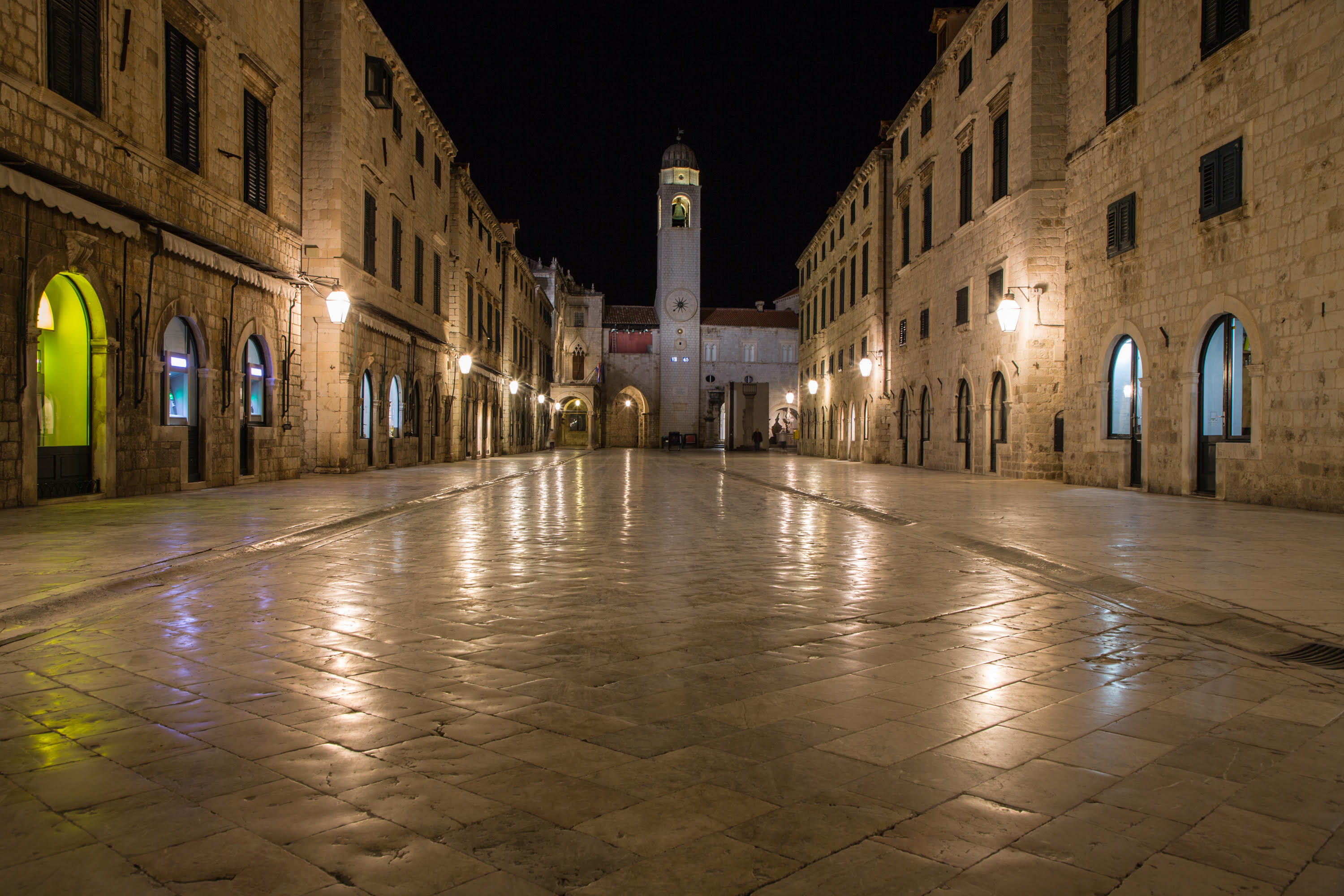
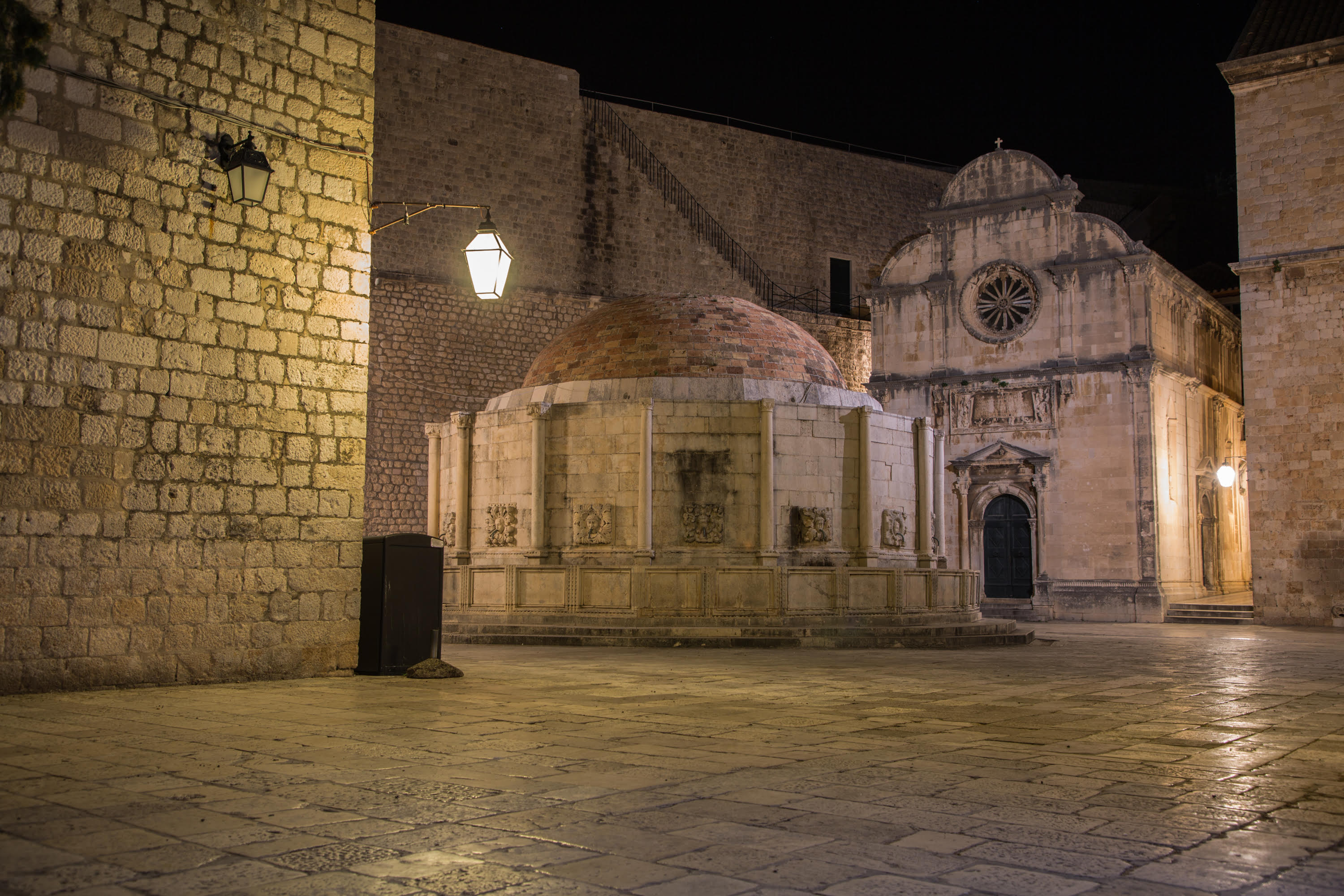
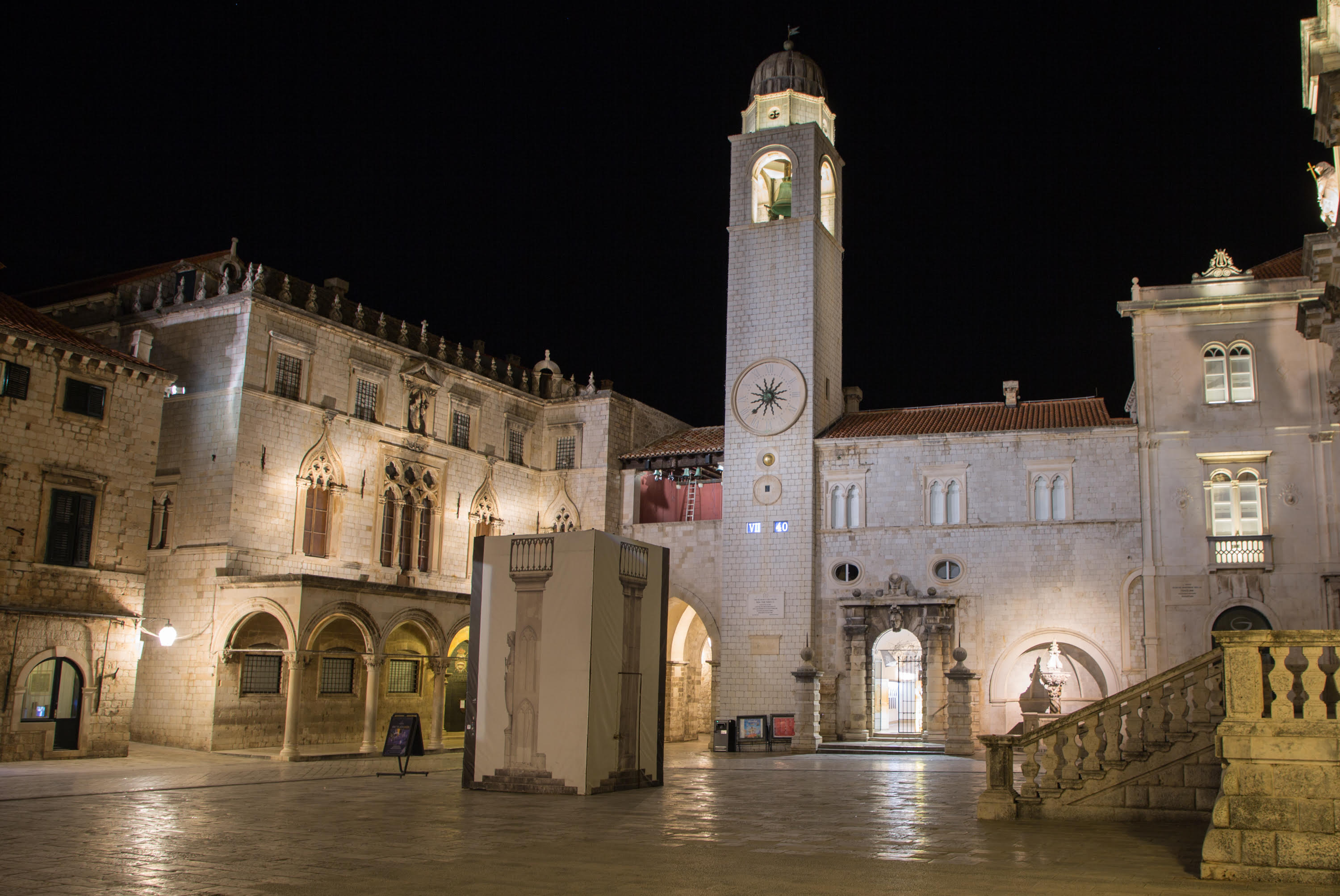
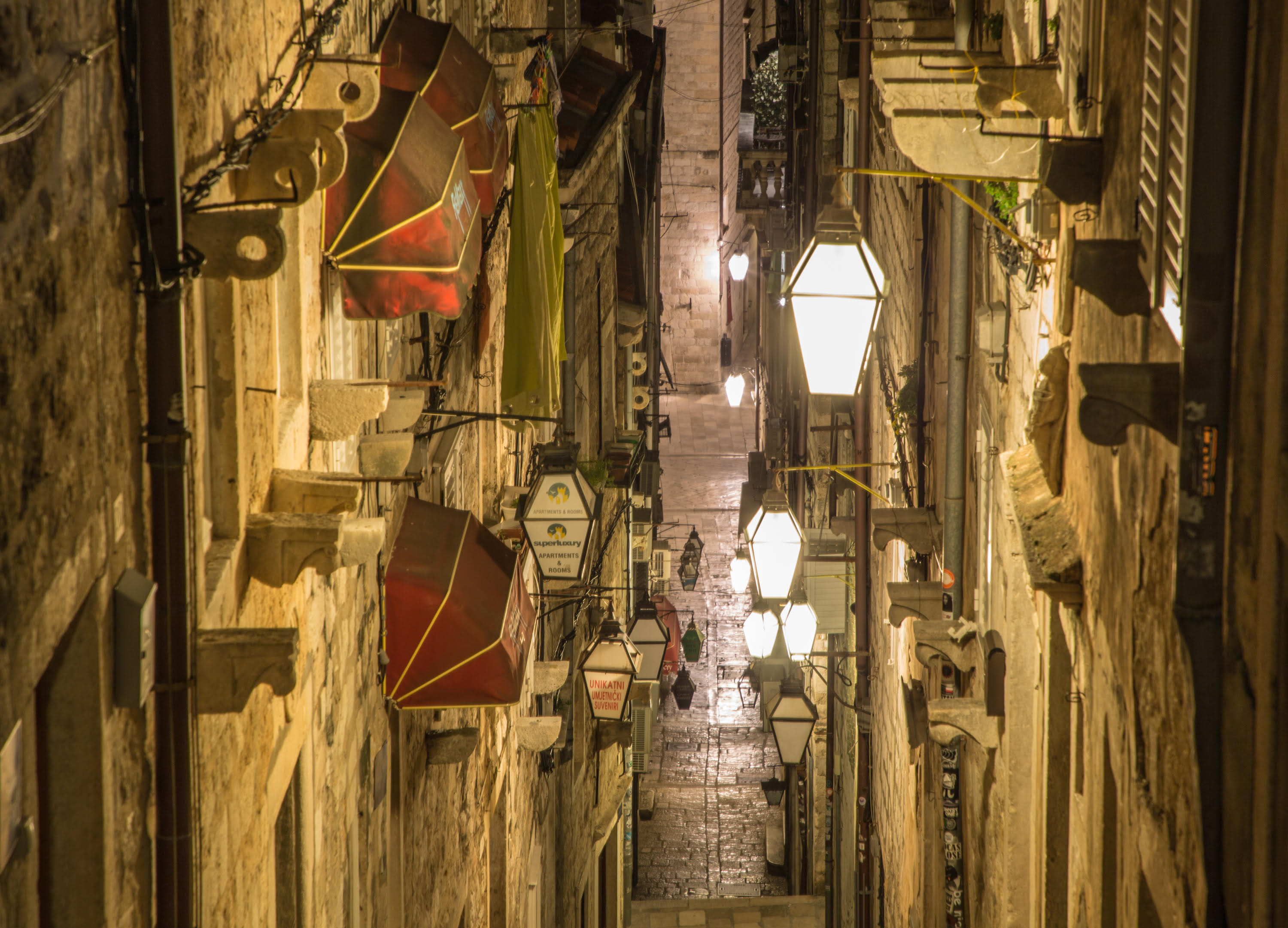
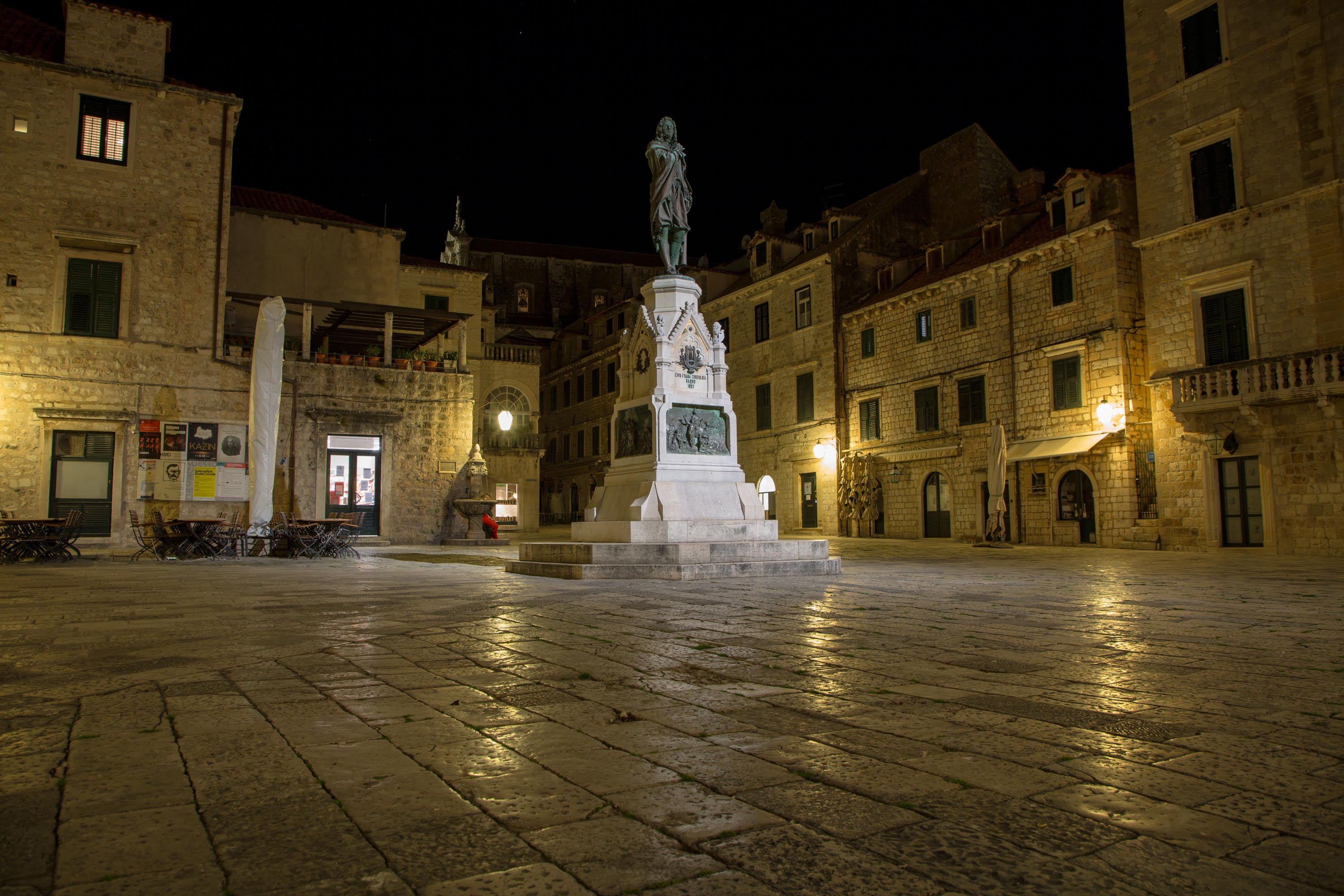
For the latest news about coronavirus in Croatia, follow the dedicated TCN section.
Post-Coronavirus Travel and Tourism: Some Predictions
March 28, 2020 - So how will post-coronavirus travel and tourism look like? Some predictions from Zoran Pejovic of Paradox Hospitality.
The good news is that coronavirus pandemic will be over one day. The bad news is that we don’t know when that day will come. The neutral news is that we have no clue how life in general, but particularly travel and tourism, will look like after the pandemic is over. What we know for certain is that it will not look as it did back in 2019.
I have already written on the needs for scenario planning. It helps you look at different scenarios based on the matrix of the optimistic and pessimistic versions of the aspects that define your business and the industry. It will also bring you out of the bubble that you might be in, by opening your eyes to different directions that the world might be heading in. Scenario planning is a proper tool, and if there was ever a time to use, it is now. It is not prophesizing or predicting.
However, we can’t fully refrain from predictions. As far as I can see there are several things that are speeding to change. We don’t know for example if social distancing will become the “new normal” in years to come, and that is one of the aspects we can use in our scenario planning matrixes. But there are other processes that were already on the way, that might just happen sooner than expected. For example, it does seem that cash is running its historic course. Online shopping will continue to flourish. Online schooling will become the new frontier and remote work will become the standard way of doing business. Mentor-mentee counseling will become the new form of high-end education, while mental health jobs will be in high demand.
There are many negative predictions as well, from climate actions losing its potency, green energy making way back to the fossil fuels, and the developing world entering numerous wars, with rising antagonism between the United States and China.
Some of these will happen as predicted, some will not, or will go into a completely different direction.
On top of these global predictions I would like to share some industry-specific thoughts.
The part of the travel and tourism industry that will recover first is leisure. Free individual travelers will want to travel as soon as it feels safe again. Some might want to travel even before that, but this is the regular 5% of the early adopters. On the other hand, parts of the industry that will suffer the most are those in the MICE segment. Meetings, incentives and conferences take a long time to plan, and there is a significant reputational risk involved for the companies that organize them, so I think it will take a long while before we see it back to the pre-corona numbers, if ever. On top of that Zoom conferences are taking place daily now, so it is not crazy to assume that portion of the industry that goes online now will never come back.
In terms of price sensitivity, it is likely to expect that the upper-middle and entry-luxury segments to come back first. A lot of the affluent travelers that belong in the category of “high income, not rich yet”, in their late thirties, forties and early fifties, will be leading the rediscovery of traveling. When it comes to mass tourism, I expect there to be a price war across the globe.
Expect 2021 top be a complete mess as well, considering that so many travel arrangement and large events have been postponed to next year.
When it comes to privacy, villas and small boutique hotels will go in high demand, and it is not unlikely that some of the over-touristic, overcrowded destinations will take a longer time to recover compared to the more remote, yet accessible destinations.
We also might see a return of longterm stays, as opposed to many shorter travels that we have seen trending over the past years, motivated by reduced travelling and exposure to the large airport hubs and airplanes.
Most of these predictions are based on something that we call prevention emotions, emotions of safety and security. Let me elaborate quickly. When choosing their holiday and travel destinations, people are driven by promotion emotions, as well prevention emotions, and this is the basis of many marketing strategies put out there. This practice is called “designing emotions”. For example, self-elevation, pleasure and recognition are promotion emotions that lead to thrill, excitement and delight. On the other hand, risk reduction, absence of problem and discomfort are examples of prevention emotions that lead to security, confidence, and satisfaction. It doesn’t take much understanding of the human psychology to assume that in the times ahead travelers might be very much motivated by prevention emotions, still probably keeping an eye on promotion emotions, so destinations that are safe and secure and that properly craft their message to the world will come back earlier than those that keep the same old campaigns as before the crisis.
Finally, where does Croatia fit into this? Croatia is one of the safest countries in the world, andit is regularly revered as one of the safest countries not only in Europe, but the world. Based on 23 different indicators, including ongoing international and domestic conflict, societal safety and security, and militarization, a 2019 study by the Global Peace Index ranked Croatia the 27th safest country in the world out of 163 countries. The United States and the United Kingdom give Croatia the lowest travel advisory level, indicating that travelers should exercise normal precautions when traveling. Croatia is easily accessible from all European capitals, and with its long and in many places still undiscovered coastline is in the perfect position to make a quick recovery, given that our economy doesn’t collapse beyond the point of no return in the meantime and given that the new, appropriate storytelling is devised as soon as possible.
We need to tell the world again stories like the one of Hvar Island literally being a health sanitarium, where with the founding of the Hvar Health Society on May 15, 1868, the first organized tourism in Europe came into being, with tourism based on health and recuperation, rather than historical sites. Or the story of more than 600 wild medicinal, aromatic and honey plant species in Croatia, 120 of which are traditionally used in folk medicine, food, oils, spirits, and more. These are perfect stories to tell, they encompass both promotion and prevention emotions dealing in health aspects, well-being and safety simultaneously.
Let’s see what gets done on a national level. In the meantime, we need to be staying visible and sending messages of well-being to the world.
You can read more on this subject of post-coronavirus travel from Zoran here:
Travel Industry: Keep Communicating and Visibility
Build Scenarios! Be Present! Take Time to Think!
You can connect with Zoran Pejovic via LinkedIn.
Milanović: Minimum Wage for All Who Have Lost Their Jobs
ZAGREB, March 28, 2020 - President Zoran Milanović said on Saturday that the state should send a clear message to those affected the most financially by the coronavirus epidemic and guarantee at least the minimum wage for all those who have lost their jobs.
"It is important that those who are economically the most affected... very soon receive a clear message - 'We are here for you'. Because people who are laying off workers, closing down their businesses... need a clear message that the state will help them. Well-intentioned promises are not enough," Milanović told reporters after visiting Zagreb's School of Medicine and University Rector's Office.
Milanović said that he had not been invited to join the government's emergency team of advisors for the economic sector as he did not belong there but that he was open to talks.
"I don't want to cause confusion in matters which are not within my remit, any advice is welcome but the government is the one making decisions," he said.
He said that the measures adopted by the government so far were "an economic shield" and protection for those who need assistance the most, and that they would change as the situation unfolds.
Milanović believes that there has been a lot of misunderstanding and poor communication between the government and those affected the most by the crisis - people who work in the private sector and whose liquidity is not strong.
The public sector should help shoulder the impact of the crisis and wages in that sector should be reduced as soon as possible, but they should not be reduced to the minimum wage, Milanović said.
"That is a very bad idea by moralists and demagogues. But those wages should be reduced and in six months' time, we'll see where we are," he said.
The state should guarantee the minimum wage for everyone who has lost their job due to the current crisis, without exception, Milanović said.
More coronavirus news can be found in the Lifestyle section.
Civil Society Groups Warn Democracy Must Not Be Forgotten
ZAGREB, March 28, 2020 - Ombudswoman Lora Vidovic believes human rights and freedoms must be restricted to protect people's health in the current epidemic, the House of Human Rights says the restrictions must pass the test of proportionality, while GONG says that democracy must not be forgotten despite the current situation.
Over the past few weeks, the national civil protection team has adopted a number of restrictive decisions with the aim of curbing the spread of the coronavirus, including a ban on the work of restaurants and bars and public gatherings and on leaving one's place of residence.
Human rights ombudswoman Lora Vidović says that some of the rights and freedoms need to be restricted in order to protect people's health and the freedoms and rights of others in the current epidemic.
She underlines, however, that restrictions may be introduced only by law or based on an explicit legal authority, their scope being the smallest possible to protect public interest.
Ivan Novosel of the House of Human Rights nongovernmental organisation says that restrictions must be proportionate to the danger of a certain phenomenon and be introduced on the basis of individual cases.
Asked how citizens can protect themselves against arbitrary restrictions in the current crisis, Novosel says that crises do not rule out democratic safeguards through which citizens protect their rights and that those safeguards cannot be suspended.
Human rights violations can be reported to the body supervising police work, the ombudswoman, nongovernmental organisations for human rights, as well as to parliamentary committees, he says.
Vidović says that dozens of citizens contact her on a daily basis.
"Most of the cases are workers who have been laid off, who are worried about their workplace safety during the epidemic, who work under a compulsory work order or who inquire about their rights during the period of unemployment. They also inquire about issues related to health insurance, restrictions on the work of farmers' markets, changes in the prices of goods, the obligation to wear face masks when entering offices, etc. We have also received a few complaints regarding measures restricting the freedom of movement," Vidović says.
Oriana Ivković Novokmet of the election monitoring NGO GONG says the task of the civil society in the current crisis is to prevent attempts to create authoritarian states and societies of control.
She says that the introduction of restrictions in the fight against the coronavirus is understandable but that preventing the misuse of those restrictions is of paramount importance.
"Just as in times of major crises, such as this epidemic, we must not forget about democracy," she says.
All restrictions must be compatible with democracy and human rights and be motivated exclusively by reasons of public health, be implemented in line with the Constitution and be time-limited.
Ivković Novokmet, Novosel and Vidović point to shortcomings of the government-sponsored bill on electronic communications, which was put forward to enable the tracking of citizens in self-isolation via their mobile phones, and they believe that the bill should be further amended.
Vidović, who has submitted an amendment to the bill, says that the bill restricts the constitutional right to privacy, which is why it needs to specify the persons to whom tracking applies, limit the duration of the measure and provide for oversight.
"It is important to enable the parliament to work as long as possible so that all relevant decisions are made through the parliament and so that the parliament can oversee the management of this crisis," says Novosel.
Ivković Novokmet says that in some countries parliamentary work has been suspended as part of measures to curb the spreading of the disease and that Prime Minister Andrej Plenkovic, too, made such an attempt, proposing that the government be given the authority to pass decrees and regulations with legal force, thus shutting out the parliament.
She warns that without the parliament's oversight, a small group of people could be deciding about issues such as restriction of movement and the tracking of people via their mobile phones, as well as possible changes to the Labour Act, suspension of collective agreements and the like.
"There is no democracy without parliament," she says.
More coronavirus news can be found in the Lifestyle section.
Mediana Fides Institute Asks Croatia's Opinion on Coronavirus Measures and More
Only 5.6 percent of those surveyed by the Zagreb-based research institute, Mediana Fides, said that the anti-epidemic measures introduced by the National Civil Protection Headquarters were too strict.
As Poslovni Dnevnik/Sergej Novosel Vuckovic writes on the 28th of March, 2020, although Croatia's new restrictive measures to curb the spread of coronavirus have been proclaimed the most stringent in all of Europe, there are still many who seem to believe the measures aren't strict enough.
Moreover, according to a survey by Mediana Fides, 46.5 percent of respondents say that Croatia should introduce even more measures, and 45.4 percent of the respondents stated that the current measures to combat the coronavirus epidemic are very much appropriate as they are. The market research firm Mediana Fides obtained these results from a survey conducted between March the 22nd and the 24th, 2020, among its 503 adult panelists from across the country, with them having paid due attention to the representativeness of the samples by gender, age and region.
As stated, only 5.6 percent of those who were asked said that the measures introduced by the National Civil Protection Headquarters were too strict. The basis of the Mediana Fides Institute's survey focused on the ''severity'' of the measures currently in place (there was also an earthquake in Zagreb to take into account).
When asked whether the respondents were properly adhering to the recommendations on staying at home consistently - 74 percent admitted that they were consistent, 24 percent said they could not be permanently at home due to work obligations, and 2 percent said they believed such measures were an exaggeration.
Regarding the fact that the situation forced many to have to work from home, we found out that more than half of those asked (52 percent of them) can't work from home due to the nature of their job and that 38 percent of people can and do work from home. For 9 percent of them, their employer hasn't even given this opportunity, and 1 percent of them cannot organise the necessary childcare.
"In conclusion, we asked respondents what they were most concerned about. Of those, 65 percent agreed on being most concerned with when the epidemic would end, and nearly half of those surveyed were also concerned about a sense of helplessness (45 percent), fear of infecting the at-risk/more vulnerable population (43 percent) and loss of income (43 percent),'' Median Fides said.
Interestingly, only 19 percent of those surveyed were most concerned about the possibility of being fired, which is somewhat inconsistent with the situation on the ground, where tens of thousands of workers have already been laid off, mostly due to a fall in employer income due to an inability to carry out business operations normally.
Make sure to follow our dedicated section for rolling information and updates in English on coronavirus in Croatia.
Croatian Tourism Association Propose Measures to Save Tourism Sector
March 28, 2020 - The Croatian Tourism Association (HUT) has drafted measures that would help preserve employment and businesses in the tourism sector.
Dalmacija Danas reports:
"As tourist traffic is at a halt, with completely closed accommodation and catering facilities across the country, and growing uncertainty throughout the main tourist season, the largest domestic tourism companies assembled in the Croatian Tourism Association (HUT) have drafted measures that would help preserve employment and businesses in a sector that generates nearly 20 percent of Croatia's total GDP.
Under these conditions, in the fight against the pandemic caused by the coronavirus, it is quite certain that a significant portion of tourism revenue will be missing this year. In such conditions, and because of the exceptional seasonality of Croatian tourism, which in four summer months generates 85 percent of total traffic, it is realistic to expect that the tourism sector will have business problems until spring 2021.
At HUT, we strongly support the Government's primary goal expressed in the presentation of the first set of measures to assist the economy, which is to save jobs and businesses in these extreme conditions. We think this is necessary because only in this way can we make a quick return as soon as the health and market conditions are created.
The proposal for tourism measures is divided into four groups.
1. The first priority is to keep jobs until next spring. For this, we need formal and material assumptions, and we propose the urgent formalization of the 'waiting workers' institute, which realistically reflects the present position of the vast majority of hospitality workers. While on hold, workers should receive a minimum wage of 60% of their net wages, which is otherwise the unemployment benefit, and employers would not pay taxes and contributions since workers do not work. The measure should be secured by next spring when we expect the normalization of business to begin.
2. The second group of measures relates to the payment of taxes and contributions and various fees.
We propose that taxes and contributions and those fees and compulsory membership fees (communal, maritime property, tourist land, water fee...) are not paid until the catering facilities are operational. After work begins, in particular, with the opening of 50% of the available capacities, the mentioned fees are paid in the amount of 30-50% to enable the beneficiaries of these benefits "survive" and have the means exclusively for the necessary functioning. This payment system is valid until 01/05/2021.
That is, we are all aware that this year's tourist turnover will be significantly reduced and it is entirely logical for employers to be exempt from paying such taxes. The delay in payment itself does not make sense, since it is already obvious that there will be no possibility of payment, but it is necessary to preserve employment and business systems until the full business is restarted.
3. The third group of measures relates to the financing of liquidity and the preparation of the next tourist season, therefore, we propose to provide grants and/or to provide favorable loans through HBOR and commercial banks for this purpose.
4. The fourth set of measures relates to reprogramming existing credit obligations for all entities that are necessary for business survival. We have also sent the measures to the Government and we expect them to be considered and adopted through the announced new economic assistance package, which is necessary for the survival of the overall economy."
Follow TCN's live updates on the coronavirus crisis in Croatia.
Cometh the Hour, Cometh the Dalmatian Solution: the Imotski Prsut Mask!
March 28, 2020 - Dalmatians have always been resourceful in times of adversity, but have they come up with the ultimate weapon to fight COVID-19 - the prsut mask?
(DISCLAIMER - Please note that in these troubled times, this is an attempt at a humorous post to lighten the mood. The prsut mask is obviously not suitable for protection from COVID-19)
Humour can be in short supply at trying times such as these, and although Brits are known for their sense of humour, I personally find the humour of Croatians and the Balkan region to be equally quality.
Especially when it comes to the darker sense of humour.
One of the things I am looking forward to experiencing in the coming nightmarish weeks is the solidarity of the people of Dalmatia. They have been used to adversity and hardship for centuries, but they have always prevailed, and I rate their survival skills as 3000 times better than a city boy like me.
But have they come up with the ultimate weapon to ward off the corona threat - the prsut mask?
Facebook page Imocki Crnjaci (Imotski Black Humour) has posted the first prsut mask on its page, with a simple message:
With love from Ljubuski (a town over the border in Hercegovina).
Local solutions for global problems, and the prsut mask is an excellent advert for the policy of shopping locally and - presumably when the hunger pangs become too strong - eating local.
The power of the prsut in Dalmatian society should not be underestimated, and a few years ago, it entered the political arena when then Split Mayor Zeljko Kerum added a prsut accessory to his forehead during a brief craze known as prsuting.

You can learn more about the crazy art of prsuting from a 2013 TCN article on the subject (we really have covered some niche topics over the years...).
And, when all this madness is over, prsut life will return to normal and play its essential role in society as part of the most popular starter in the region - Dalmatian prsut, Pag cheese and Dalmatian olives.
May that return to normal be soon.
Stay safe, and for the latest coronavirus updates, follow the dedicated TCN section.
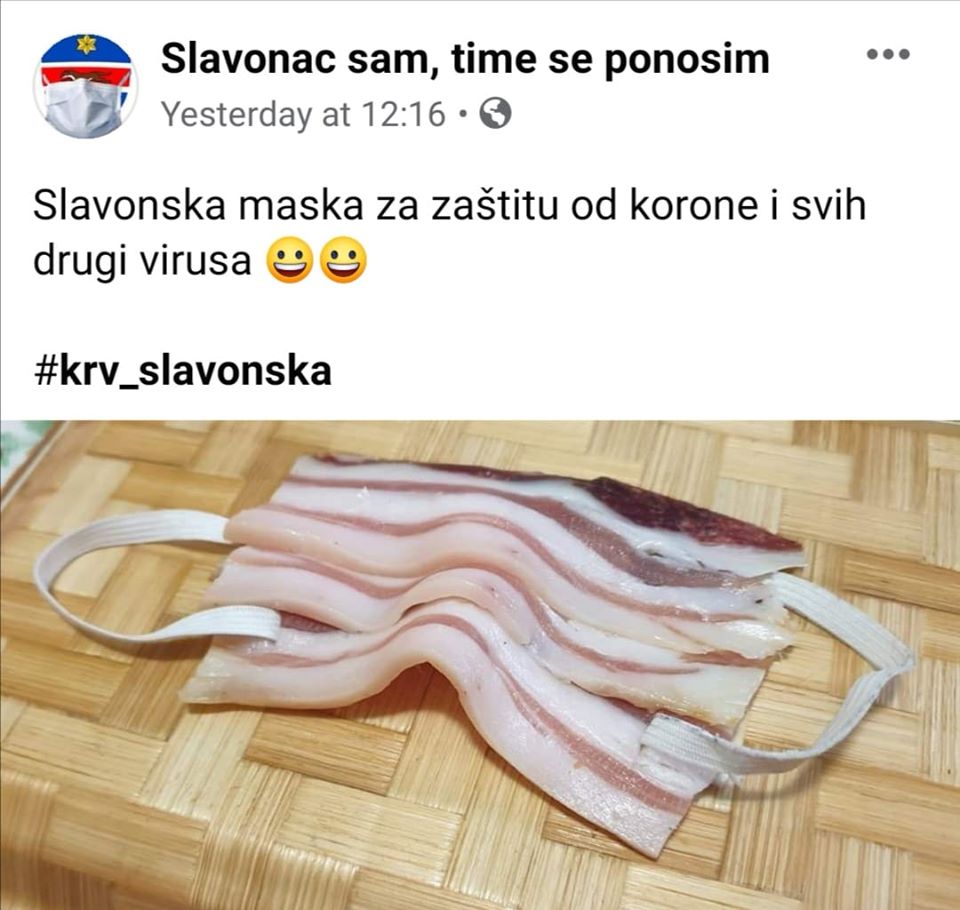
Article update from TCN reader Kristijan Jakovic seconds after this was posted on our FB:
Wrong, that's Slavonian slanina.
Dalmatian or Slavonian - one thing is for sure. Pure genius.
Podravka Donates 900,000 Kuna to Hospitals for Coronavirus Fight
As Novac writes on the 28th of March, 2020, in order to help those who currently need assistance during the coronavirus outbreak, the management and vice-presidents of the Podravka Group, as well as the rest of the company's management, will set aside a portion of their own personal income and donate it for humanitarian purposes.
To date, those individuals from the well known Croatian company Podravka have raised more than 900,000 kuna, which they will donate to Croatian hospitals for the procurement of essential respirators and other necessary medical equipment needed to try to manage the current coronavirus pandemic.
''In addition to our regular humanitarian assistance, the least we as individuals can do is, in addition to organising our business operations appropriately during these extraordinary times, personally help out financially, so that our contribution can be incorporated into the purchase of respirators that may help save someone's life, or protect the lives of those who are busy saving lives by purchasing protective equipment.
I'm proud to be at the forefront of a company whose workers are wholeheartedly accomplishing their tasks, and whose management has never hesitated for a second in individually allocating their personal funds to be part of this humanitarian story,'' said the initiator of the initiative, Marin Pucar, CEO of Podravka.
In addition, as they emphasised, the Podravka Group's employees are working at full capacity these days. Production has been properly organised into three to four shifts, they claim, and their warehouses are working until late at night to load goods into trucks.
''Quality control laboratories are monitoring our production work flawlessly, some employees from corporate and administrative departments have been sent home to reduce the potential risk of them contracting coronavirus, and work from home for them has been organised. There are sufficient quantities of food and medicines to stop shop shelves from becoming empty,'' they state from Podravka.
Make sure to follow our dedicated section for rolling information and updates on coronavirus in Croatia.
HNK Zagreb Online Performances Have Almost 300,000 Views
ZAGREB, March 28, 2020 - The Croatian National Theatre (HNK) in Zagreb, in cooperation with the 24 sata daily newspaper, has made some of its most popular performances available online, attracting almost 300,000 views in just over a week.
It has been just over a week since the Zagreb HNK, in cooperation with the 24sata editorial board, launched the project "HNK in Zagreb fighting against the coronavirus". Performances by opera, drama and ballet troupes, as well as the Philosophical Theatre programmes, are available every day on the 24sata YouTube channel, 24sata website, and the HNK Facebook page, the HNK said in a press release.
"Theatre in the homes of our viewers has thrilled all performing arts enthusiasts and attracted new audiences, those who have not had a chance up to now to see a play at the HNK in Zagreb. Up to this day, our performances, released on the 24sata YouTube channel, have attracted 299,168 views," the HNK said.
In this way, the HNK has been able to re-establish communication with its audience in this tragic time of isolation, after it was closed on 12 March, but also to cross virtual borders and become present in numerous European and world cities and on different continents, the theatre said.
More coronavirus news can be found in the Lifestyle section.
Minimum Wage Requested for 253,000 Workers
ZAGREB, March 28, 2020 - Labour and Pension System Minister Josip Aladrović has said that by Friday, 43,000 employers sought assistance as part of the government's first set of measures designed to alleviate the impact of the coronavirus pandemic on the economy, asking the state to pay the minimum wage for 253,000 employees.
Asked if he was surprised by the large number of applications, the minister said in an interview with RTL that initial estimates had predicted that minimum wages would be sought for around 500,000 workers.
He recalled that between four and six billion kuna would be ensured for those wages.
"We are glad that payments started already on Wednesday, which means that the Employment Service has been dealing with applications swiftly... we believe that it is important that the right to be paid the minimum wage be granted to everyone meeting the set conditions by the time when March wages have to be paid," the minister said.
He also noted that the government's second set of measures designed to mitigate the impact of the coronavirus pandemic on the economic sector would not include tax write-offs or the write-off of contributions.
More coronavirus news can be found in the Lifestyle section.

